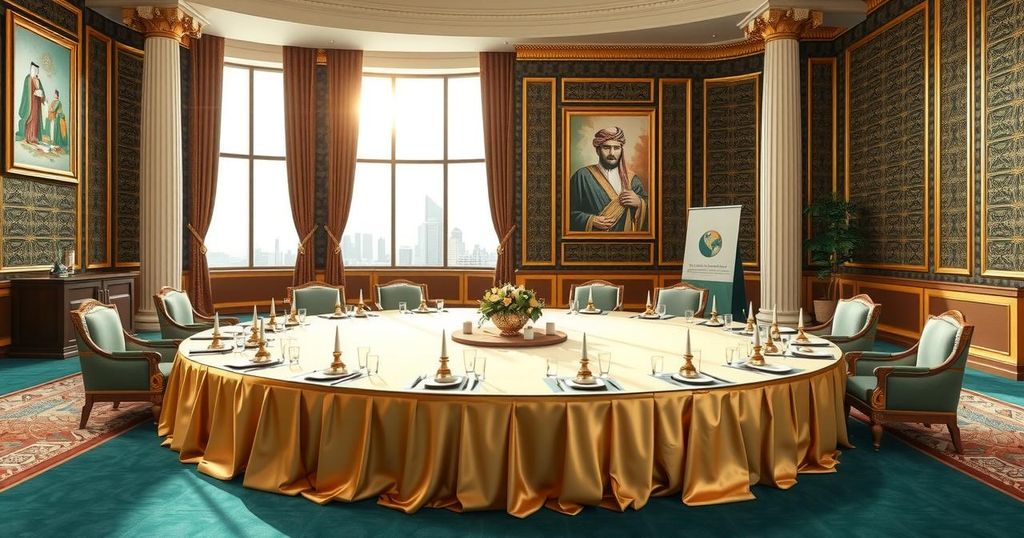Ukrainian President Volodymyr Zelensky is visiting Saudi Arabia to discuss diplomatic relations as Riyadh seeks to establish itself as a global mediator. This shift aims to enhance its image beyond oil and security, despite its contentious human rights issues. Saudi Arabia’s mediation efforts extend to international conflicts, while U.S. interests align with these evolving dynamics, particularly in relation to the Abraham Accords.
President Volodymyr Zelensky of Ukraine is traveling to Saudi Arabia to meet with Crown Prince Mohammed bin Salman (MBS), marking a significant development as Riyadh seeks to redefine its international profile as a mediator. Traditionally perceived as a regional power focused on oil and security, Saudi Arabia is now aiming to enhance its role in global diplomacy amid ongoing regional conflicts and its controversial human rights record.
Under Bin Salman’s leadership, Saudi Arabia has shown its diplomatic capabilities, notably facilitating prisoner exchanges between Russia and Ukraine. In 2022, the Kingdom played a pivotal role in securing the release of ten foreign captives, including United States and United Kingdom nationals, thereby solidifying its position as an effective intermediary in critical international matters.
Saudi Arabia’s strategic relationships with Moscow, Kyiv, and Washington, along with its status as the world’s leading oil producer, underscore its vested interest in global stability, particularly since protracted conflicts can unsettle energy markets. By acting as a power broker, the Kingdom aims to reshape its global image, extending its mediation efforts beyond Ukraine to include conflicts in Sudan, Iran, and Syria, emphasizing dialogue over sanctions and punitive measures.
For the United States, fostering Saudi Arabia’s diplomatic involvement is vital for advancing the Abraham Accords, which promote normalization of relations between Israel and Arab nations. Aryeh Lightstone, a former US advisor, remarked on Israel’s evolving influence, noting that it has grown from regional isolation to engagement with significant countries.
Saudi Arabia’s influence in the Middle East is crucial for the Accords, and its readiness to negotiate with adversarial states like Iran showcases its expanding diplomatic leverage. By engaging with the Kingdom, the US aims to push its broader Middle East strategy while securing alignment with Western-led peace initiatives.
The Kingdom has faced international indignation, particularly post the 2018 assassination of journalist Jamal Khashoggi, allegedly sanctioned by the Crown Prince, which Riyadh denies. Despite its increasing diplomatic efforts, the Saudi regime is notorious for its human rights violations, including restrictions on women and brutal crackdowns on dissent. Activist Salma al-Shehab was sentenced to 34 years in prison for advocating women’s rights, demonstrating the severity of ongoing abuses.
As Saudi Arabia strives to improve its image and establish itself as a central diplomatic player, it has also initiated efforts to reinforce its global role through high-profile summits and negotiations, including explicit discussions regarding the Russia-Ukraine conflict. However, criticisms arose concerning the exclusion of the EU and Ukraine from significant dialogues, revealing concerns of sidelining key stakeholders in ongoing disputes.
President Zelensky’s visit to Saudi Arabia underscores Riyadh’s ambition to transform its diplomatic standing on the global stage. By leveraging its relationships and acting as a mediator in various international conflicts, Saudi Arabia seeks to cultivate a reputation as a facilitator of peace, despite its troubling human rights record. This evolving role not only enhances its influence in the Middle East but also aligns with U.S. interests in promoting stability and advancing peace initiatives such as the Abraham Accords.
Original Source: www.rfi.fr




